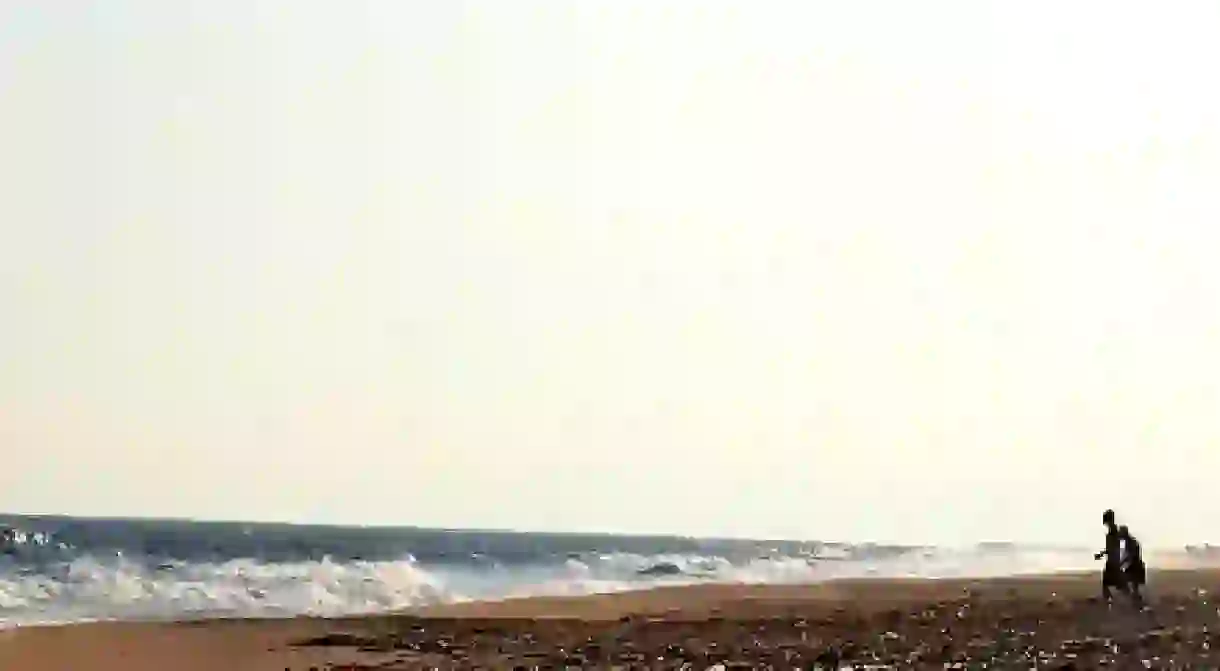A Day at the Beach in Ghana: What You Should Know

Ghana’s stunning coastline, burgeoning surfing community and a vibrant beach culture are some of the amazing things to see and do on a day by the sea. But knowing all the facts will ensure the most enjoyable and safest trip possible.
A sea view dotted with narrow fishing boats and fearless surfers, a shoreline steeped in history, the sound of waves crashing on soft, yellow sand filling the air, Ghana’s 539km of rugged coastline provide any visitor with a relaxing break from city life. The beautiful Ghanaian shores from Cape Three Points to Aflao also have a few hidden dangers of which travellers should be aware.
The dangers of swimming in the sea
All things aside, there are a number of beautiful beaches in Ghana that will assure a memorable and fulfilling trip. Sunbathing, cocktails, music, parties: the beach is a great place to be. However you might notice that most people on the beach choose not to swim – at least not very far out. This is because, the rip currents in the Gulf of Guinea are incredibly strong and can be dangerous, especially for amateurs and young ones. Some locations are perilous because of unseen but powerful rip currents.
There is some help to be found, however, in the formation of The Ghana National Aquatic Rescue Unit (GNARU), which is comprised of volunteers, firefighters, and military personnel, which has been rolled out to schools. The founder of the GNARU, Felix Uzor, claims that although there is no official number of those who’ve drowned at sea, the number is high and higher still during the holidays. So far, Uzor’s project has trained over 31,000 people and has ensured that beaches are equipped with simply-made lifebuoys.

Pollution at sea
One more thing is that the case of plastic pollution is a threat to the beach business. Ghana is left with a financial burden of $290 million annually due to waste mismanagement. Efforts toward building designated sanitation points on or nearby beaches is a plan to create cleaner beaches. Another hugely significant issue is the phenomenon of plastic waste in the sea and littered along the beautiful beaches. There are team projects that aim to curb the plastic waste mess, including Dr. Monk and Nelplast. Dr. Monk‘s The Church of Climate Change is a social change project that organises beach cleaning exercises between Accra and Tema. Nelson Boateng’s company, Nelplast, mixes sand with shredded plastic and red oxide to make pavement blocks.
Surfing in Ghana
It is actually outside Central Accra beaches that you come across the growing Ghanaian surfing and beach sport culture. Kokrobite Carvers is a group of surfers from Kokrobite and its surrounding areas, just about 40km from Accra. Ghana’s first official surf beach, Busua, is home to Ahanta Waves, run by local surfers. Some other surfing organisations are Mr. Brights Surf School, West African Surfing Association and Busua Beach Boardriders. The annual International Surf Day Contest takes place across the globe in more than 30 countries including Ghana. Keen surf contests come with barbecue breaks, film screenings, beach cleanups, ocean habitat restoration and awareness on coastal protection.
Where is it safe to swim Ghana’s most popular beaches?
It’s advisable to aim for shores outside central Accra to avoid overpacked and plastic-splattered beaches. These are some of the county’s most popular and cleaner beaches for you to enjoy – but keep in mind, the ocean currents are strong along most of Ghana’s coastline.
Labadi Beach
Natural Feature


Busua Beach Resort
Resort

Ada Foah
Resort, Bed and Breakfast, Spa Hotel














